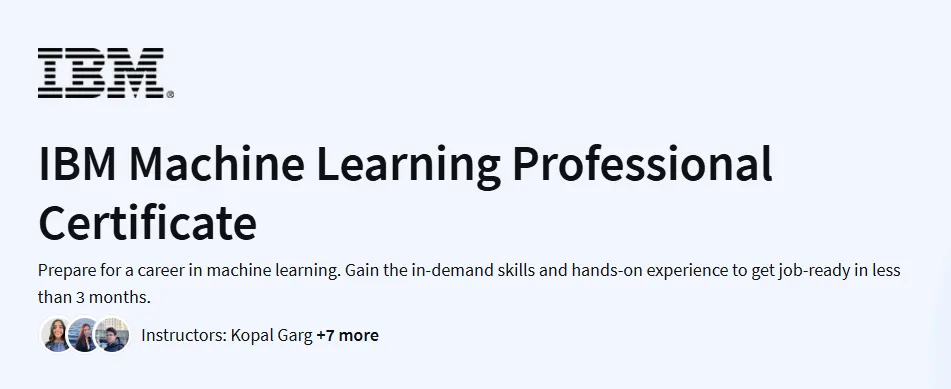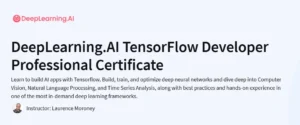What you will learn in IBM Machine Learning Professional Certificate Course
- Gain a solid foundation in machine learning (ML) and its real-world applications.
- Learn how to use Python, Scikit-Learn, TensorFlow, and IBM Watson for ML tasks.
- Master supervised, unsupervised, and reinforcement learning techniques.
- Understand the principles of data preprocessing, feature engineering, and model evaluation.
- Develop skills in deep learning, neural networks, and AI deployment.
- Apply your knowledge through hands-on projects and labs using real datasets.
Program Overview
Introduction to Machine Learning
⏱️2-4 weeks
- Understand the fundamentals of machine learning algorithms and AI concepts.
- Learn about supervised vs. unsupervised learning.
- Explore real-world applications of ML in various industries.
Data Science & Feature Engineering
⏱️ 4-6 weeks
- Learn how to clean, preprocess, and transform datasets for ML models.
- Understand the importance of feature selection and feature scaling.
- Use Python libraries like Pandas, NumPy, and Scikit-Learn for data analysis.
Supervised & Unsupervised Learning Techniques
⏱️ 6-8 weeks
- Implement algorithms like linear regression, decision trees, and clustering.
- Learn how to evaluate model performance using metrics like accuracy and RMSE.
- Understand bias-variance tradeoff and overfitting prevention techniques.
Deep Learning & Neural Networks
⏱️ 8-10 weeks
- Learn the fundamentals of deep learning and artificial neural networks (ANNs).
- Use TensorFlow and Keras to build and train deep learning models.
- Explore convolutional neural networks (CNNs) and recurrent neural networks (RNNs).
Capstone Project – End-to-End ML Model Deployment
⏱️ 10-12 weeks
- Apply all learned skills to develop and deploy a machine learning model.
- Work with real-world datasets to solve an industry problem.
- Showcase your project to enhance your portfolio and job prospects.
Get certificate
Job Outlook
- Machine Learning Engineer roles are growing rapidly, with a projected 22% job growth by 2030.
- The average salary for ML engineers ranges from $90K – $150K+, depending on experience.
- ML skills are in high demand across industries like finance, healthcare, e-commerce, and AI research.
- Employers seek professionals with expertise in Python, Scikit-Learn, TensorFlow, and AI frameworks.
- ML knowledge provides pathways into AI research, data science, and deep learning specialization.
Explore More Learning Paths
Boost your machine learning expertise with these curated programs designed to help you build predictive models, implement ML algorithms, and apply practical solutions in real-world scenarios.
Related Courses
Applied Machine Learning in Python Course – Learn hands-on ML techniques using Python, including model building, evaluation, and deployment for real datasets.
Machine Learning for All Course – Gain a beginner-friendly overview of machine learning concepts and applications, with minimal programming prerequisites.
Practical Machine Learning Course – Apply machine learning in realistic scenarios, practicing data preprocessing, modeling, and performance evaluation.
Related Reading
Gain insight into the foundational role of data in machine learning:
What Is Data Management? – Understand how organizing and maintaining data effectively is critical for training accurate and reliable ML models.
Specification: IBM Machine Learning Professional Certificate Course
|
FAQs
- A beginner-level, self-paced online program delivered through Coursera, developed by IBM, designed to prepare learners for entry-level roles in data science and machine learning. No prior data or coding experience is required.
- Comprising 10 comprehensive courses, including:
- Introduction to Data Science
- Tools for Data Science
- Data Science Methodology
- Python for Data Science
- Python Project
- Databases & SQL
- Data Analysis
- Visualization
- Machine Learning
- Capstone Project
- You’ll earn a Professional Certificate and an IBM digital badge, complete with hands-on labs using IBM Cloud and real-world datasets.
- Ideal for absolute beginners—students, career changers, or anyone looking to gain practical data science skills from scratch.
- The program is structured to progress step-by-step from foundational concepts to more complex data science techniques, making it accessible regardless of your background.
- You’ll gain hands-on proficiency with:
- Python libraries: Pandas, NumPy, Scikit-learn, Matplotlib
- SQL and database interaction
- Data cleaning, exploration, visualization
- Supervised and unsupervised machine learning models
- The Applied Data Science Capstone ties it all together—guiding you through a full data project from wrangling to modeling and visual presentation.
- Pros:
- Credentialed by IBM with ACE/ECTS recognition — potentially worth 12 college credits.
- Real-world project portfolio and badge help demonstrate practical skills to employers.
- Considerations:
- Some learners report misaligned content, outdated instructions, or lack of instructor support.
- Many caution that certificates alone don’t guarantee job placement—it’s the portfolio and demonstrated ability that count most.





